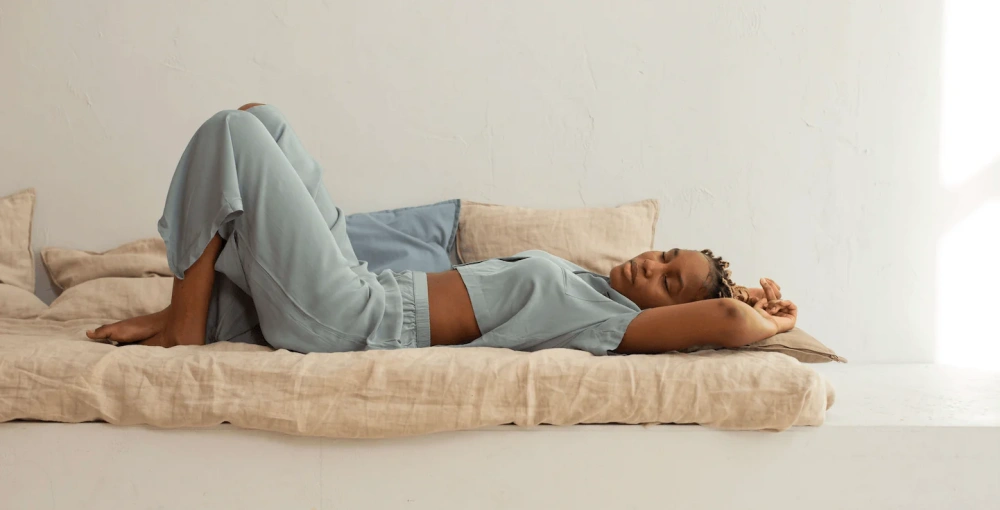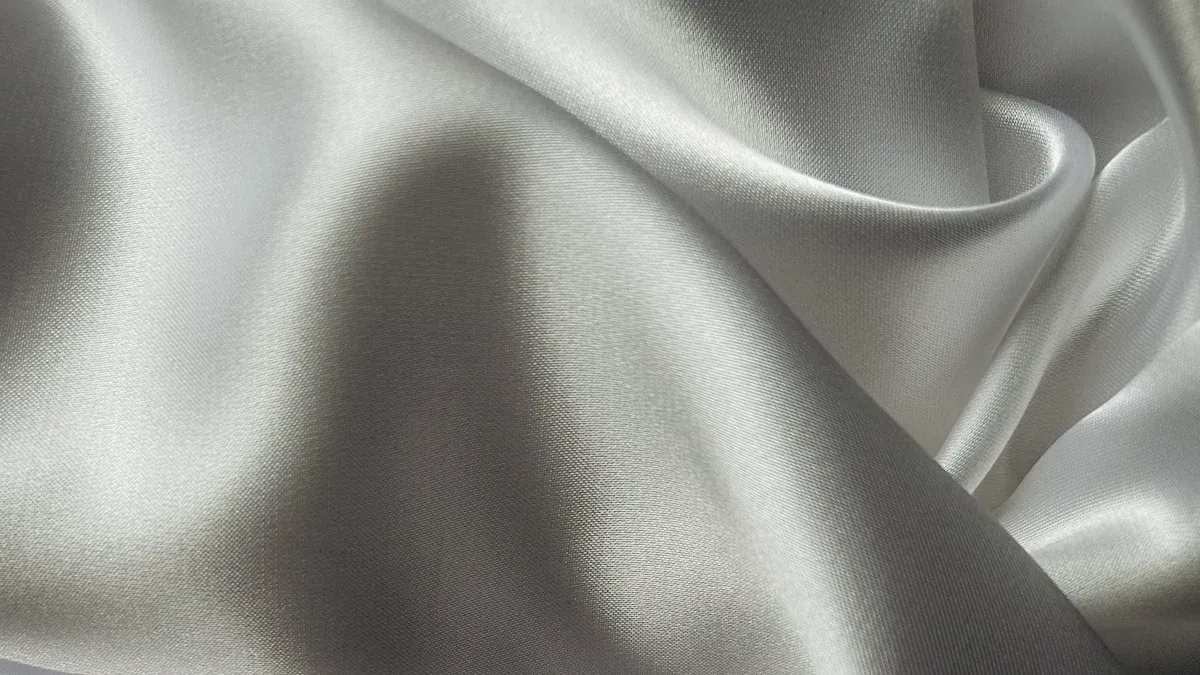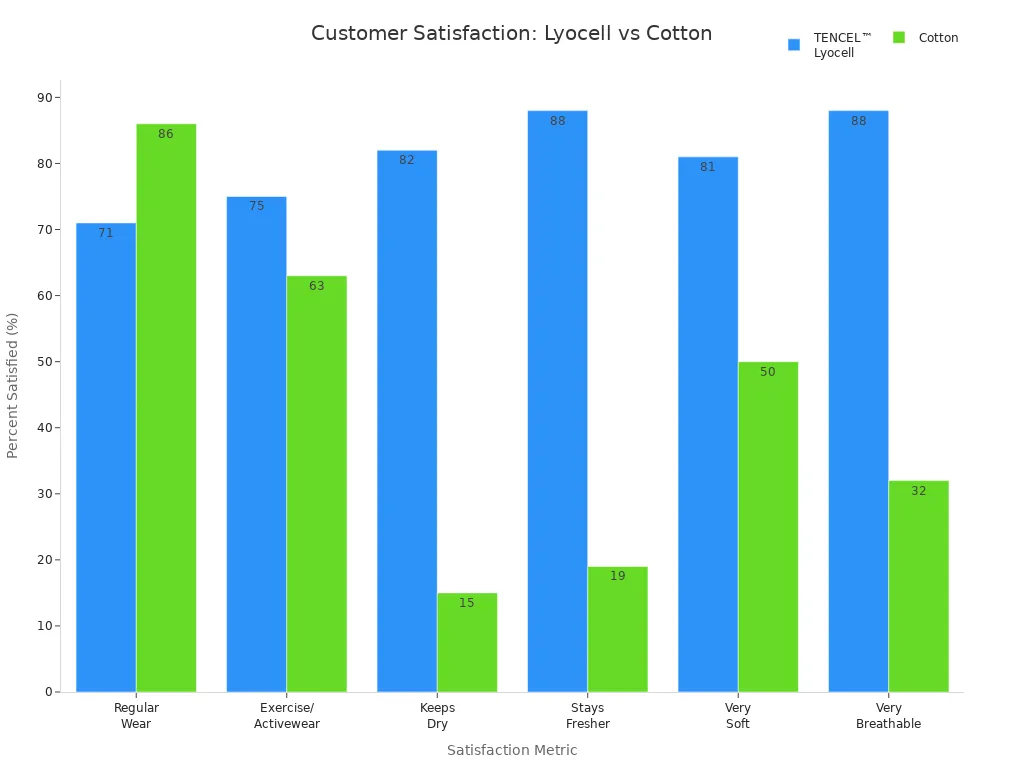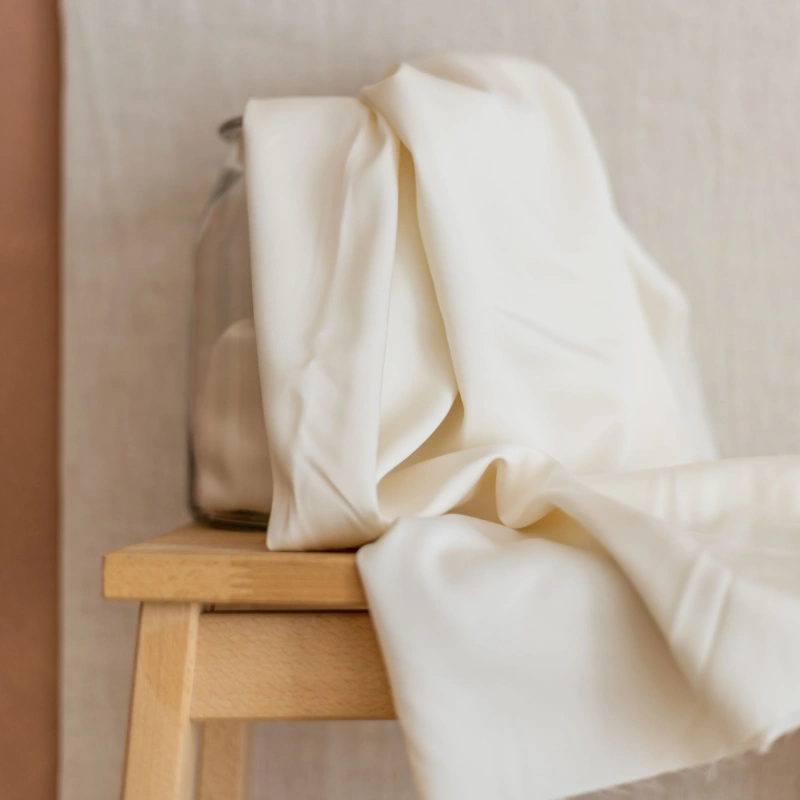
Comparing Lyocell and Cotton for Sensitive Skin
Explore which fabric suits sensitive skin better: lyocell or cotton.
Features | lyocell pajamas | cotton pajamas |
|---|---|---|
Softness | Ultra-soft, silky, and stays soft after washes | Naturally soft but less silky |
Hypoallergenic | Highly hypoallergenic, with fewer chemical residues | Good, may contain more residues |
Irritation | Minimal friction, gentle on skin | Can irritate some |
Breathability | Superior airflow, dries quickly | Good airflow, holds moisture longer |
Moisture Absorption | Absorbs 50% more moisture | Absorbs moisture but dries more slowly |
Durability | Retains strength when wet, resists wear | Strong but weakens when wet |
Care | Cold wash, air dry, low heat iron | Cold/warm wash, air dry, higher heat iron |
Sustainability | Eco-friendly, low water, FSC-certified | High water use, pesticide-dependent |
Price | Higher cost, better long-term value | Lower upfront cost, may wear out |
If you have sensitive skin, you probably want pajamas and sheets that feel gentle and comfortable every night. When considering lyocell fabric vs cotton, you’ll notice that TENCEL™ lyocell stands out for its incredible softness and hypoallergenic properties.
Both lyocell and cotton are popular choices, but TENCEL™ fabric feels smoother and often causes less irritation. You’ll find that TENCEL™ pajamas and lyocell sheets offer outstanding comfort, while organic cotton pajamas and cotton sheets also provide a soft, comfortable sleep experience.
Check out the quick comparison table below to see how lyocell fabric vs cotton stack up in softness, comfort, and feel.
Key Takeaways
TENCEL™ lyocell fabric feels softer and smoother than cotton, making it very gentle on sensitive skin.
Lyocell is highly hypoallergenic and reduces irritation thanks to its smooth fibers and fewer chemical residues.
TENCEL™ pajamas and sheets breathe better and wick moisture faster, keeping you cool and dry at night.
Lyocell fabric lasts longer and keeps its softness after many washes, offering great long-term value.
TENCEL™ lyocell is eco-friendly, using less water and energy than cotton and coming from sustainable sources.
Lyocell Fabric vs Cotton: Sensitive Skin

Let’s break down how lyocell fabric vs cotton compares when it comes to sensitive skin. You want pajamas and bedding that feel gentle, cozy, and comfortable every night. Here’s a quick table to help you see the main differences at a glance:
Feature | TENCEL™ Lyocell (TENCEL™ fabric, TENCEL™ pajamas) | Cotton (including organic cotton pajamas) |
|---|---|---|
Softness | Ultra-soft, silky, retains softness after washes | Naturally soft, but less silky |
Hypoallergenic | Highly hypoallergenic, with fewer chemical residues | Good, but may contain more residues |
Irritation | Minimal friction, gentle on sensitive skin | Can cause irritation for some |
Comfort | Superior, smooth, cozy softness | Comfortable, classic feel |
Softness
When you touch TENCEL™ pajamas or TENCEL™ fabric, you’ll notice an immediate difference in softness. Lyocell fibers have a smooth surface that feels almost like silk. This isn’t just marketing talk—industry tests, like the German TSA (Tissue Softness Analyzer), show that lyocell fibers have a smaller diameter and a smoother surface than cotton.
That’s why TENCEL™ pajamas and lyocell sheets feel so gentle and cozy against your skin, even after many washes. Cotton, especially organic cotton pajamas, also feels soft and comfortable, but lyocell takes softness to another level.
You get a sense of cozy softness that lasts, making TENCEL™ fabric a favorite for anyone who values comfort.
Tip: If you want pajamas that stay soft and comfortable to wear night after night, TENCEL™ pajamas are a great choice.
Hypoallergenic
If you have sensitive skin, you know how important it is to avoid irritation and allergies. TENCEL™ lyocell stands out as a hypoallergenic option. Here’s why so many people with sensitive skin choose TENCEL™ fabric and TENCEL™ pajamas:
TENCEL™ lyocell comes from sustainably sourced wood pulp and uses a closed-loop, non-toxic process. This means fewer chemical residues compared to conventional cotton.
The smooth fiber surface of TENCEL™ fabric reduces friction, which helps prevent eczema flare-ups and irritation.
TENCEL™ pajamas absorb up to 50% more moisture than cotton, keeping your skin dry and comfortable.
Clinical studies show that people with atopic dermatitis experience less redness and itching when wearing TENCEL™ clothing.
TENCEL™ fabric’s breathability and moisture-wicking properties create a cooler, less bacteria-prone environment, which is perfect for sensitive or allergy-prone skin.
Organic cotton pajamas are also a good hypoallergenic choice, especially if you want a natural, pesticide-free option. However, TENCEL™ pajamas often provide even better comfort and skin protection.
Irritation
You want pajamas and bedding that don’t make your skin itch or feel uncomfortable. TENCEL™ lyocell shines here, too. The smooth surface of TENCEL™ fabric means less friction and rubbing, so you’re less likely to experience irritation.
Many people with sensitive skin report that TENCEL™ pajamas help reduce redness, itching, and discomfort. The moisture-wicking ability of TENCEL™ fabric also keeps your skin dry, which helps prevent irritation from sweat or heat.
Cotton, including organic cotton pajamas, is generally comfortable and gentle. Still, some people find that cotton can irritate, especially if the fabric is rough or if it contains chemical residues from processing.
TENCEL™ pajamas and lyocell sheets offer a level of cozy softness and comfort that’s hard to beat, especially if you have sensitive skin.
In the lyocell fabric vs cotton debate, TENCEL™ fabric and TENCEL™ pajamas consistently come out ahead for softness, hypoallergenic qualities, and comfort. If you want the ultimate in cozy softness and gentle care for your skin, TENCEL™ pajamas are a smart, comfortable choice.
Breathability & Moisture

Night Sweats
If you often wake up feeling hot or sweaty, you know how important breathability is in your pajamas and sheets. TENCEL™ lyocell stands out for people who struggle with night sweats. The fabric’s unique structure lets air move freely, so heat and moisture don’t get trapped next to your skin.
You stay cooler and drier through the night. Cotton is also breathable, but it tends to hold onto moisture longer. When you sweat, cotton can feel damp and heavy, which may make you uncomfortable.
TENCEL™ pajamas absorb moisture quickly and dry faster than cotton. This means you won’t wake up feeling sticky or clammy. If you want pajamas that help you sleep cool and dry, TENCEL™ lyocell is a great choice. You get a soft and breathable feel that keeps you comfortable, even on warm nights.
Tip: If you deal with night sweats, try switching to TENCEL™ pajamas for a cooler, drier sleep.
Airflow
Airflow is a big part of breathability. Controlled studies show that TENCEL™ lyocell fabrics allow much more airflow than cotton. The smooth, lightweight fibers in TENCEL™ create tiny channels that let air pass through easily.
This higher airflow means your skin can breathe, and sweat evaporates quickly. Cotton, on the other hand, is denser and holds onto moisture, which blocks airflow and can leave you feeling damp.
You’ll notice the difference when you wear TENCEL™ pajamas or sleep on lyocell sheets. They feel light, fresh, and breathable all night. Cotton pajamas are still a good option, but if you want the best breathability and airflow, TENCEL™ lyocell comes out on top.
TENCEL™ lyocell: Superior breathability, more airflow, dries fast
Cotton: Good breathability, but less airflow, can feel damp
Choosing the right fabric can make a big difference in how comfortable you feel at night. If breathability and staying dry matter to you, TENCEL™ lyocell is hard to beat.
Durability & Care
Longevity
When you invest in pajamas or bedding, you want them to last. Both TENCEL™ lyocell and cotton have strong reputations, but their durability can differ in real life. Here’s how they stack up:
TENCEL™ lyocell keeps about 90% of its strength even when wet. That means it stands up well to washing and daily use.
The unique fiber structure in TENCEL™ resists pulling, tearing, and general wear better than most cotton fabrics.
Many people say their TENCEL™ pajamas keep their shape and softness for years, making them a favorite for long-term comfort.
Cotton is also known for being strong and dependable. About 70% of people consider cotton durable and long-lasting.
The lifespan of cotton depends on the quality of the fibers and the weave. For example, denim (a twill weave) lasts longer than plain-weave cotton.
Cotton can weaken when wet and may shrink after washing, which sometimes shortens its life.
If you want pajamas that stay looking and feeling great for years, TENCEL™ lyocell often outperforms cotton, especially if you wash your clothes often or wear them a lot.
Maintenance
Taking care of your pajamas or sheets helps them last longer. Lyocell and cotton both need a little attention, but their care routines are a bit different.
Wash lyocell in cold water with gentle detergent. This keeps the fibers strong and prevents shrinking.
Air drying is best for lyocell. If you use a dryer, pick low heat and take your clothes out quickly to avoid over-drying.
Iron lyocell while it’s still damp, using low to medium heat. This helps prevent creases and keeps the fabric smooth.
Store lyocell in a cool, dry place away from sunlight to protect the color and fabric.
Treat stains on lyocell right away with gentle stain removers.
For organic cotton, use a delicate cycle or hand wash in cold water. Reshape the item when wet and dry it flat or hang it up to avoid shrinking or stretching.
Both fabrics last longer if you wash them less often and let them air out between uses.
Tip: Gentle care goes a long way. By following these steps, you help your pajamas and sheets stay soft, strong, and comfortable for years to come.
Environmental Impact
Sustainability
When you care about the planet, choosing eco-friendly pajamas and bedding matters. TENCEL™ and cotton both have an impact, but you’ll notice some big differences if you look closer at sustainability.
TENCEL™ stands out as an eco-friendly material because it uses wood pulp from fast-growing eucalyptus trees. These trees grow on land that isn’t good for food crops and don’t need pesticides or irrigation. The Forest Stewardship Council (FSC) certifies the forests, so you know the wood comes from well-managed sources.
Cotton, on the other hand, needs a lot of water and pesticides to grow. Conventional cotton farming can use up to 20,000 liters of water for just one kilogram of fabric. That’s a huge amount! TENCEL™ production uses much less water and energy.
The fabric is also biodegradable and compostable, so it won’t sit in a landfill for years. If you want sustainable sleepwear, TENCEL™ is a smart choice for anyone who wants an environmentally friendly fabric.
Here’s a quick look at how these eco-friendly materials compare:
Feature | TENCEL™ Lyocell | Cotton |
|---|---|---|
Water Use | Low | Very high |
Pesticides Needed | None | High |
Biodegradable | Yes | Yes |
Certification | FSC-certified forests | Varies |
Yes | Sometimes |
Tip: If you want sustainable sleepwear that’s gentle on the earth, TENCEL™ makes it easy to feel good about your choice.
TENCEL™ Production
TENCEL™ production uses a truly eco-friendly closed-loop process. This means the factory recycles over 99% of the organic solvent used to turn wood pulp into fabric. You get a soft, high-quality material without the waste.
The process also uses less water and energy than cotton production. You don’t have to worry about harmful chemicals, since TENCEL™ doesn’t need pesticides or harsh treatments.
TENCEL™ fibers even use recycled cotton scraps through Refibra™ technology, which cuts down on waste and makes your sleepwear even more sustainable. The breathability of TENCEL™ means you can wash your pajamas less often, saving even more water.
If you want eco-friendly sleepwear that supports a cleaner planet, TENCEL™ is the way to go.
TENCEL™ uses a closed-loop system, recycling almost all chemicals.
Less water and energy are needed compared to cotton.
No pesticides are used in TENCEL™ production.
TENCEL™ fibers are biodegradable and compostable.
The process supports sustainable sleepwear and eco-friendly materials.
Choosing TENCEL™ means you’re picking an environmentally friendly fabric that’s gentle on your skin and the earth.
Price & Value
Cost
When you shop for pajamas or bedding, price often plays a big role in your decision. You’ll notice that Tencel pajamas usually cost more than organic cotton pajamas or cotton sheets. This higher price comes from the advanced technology and sustainable process used to make TENCEL™ fabric.
If you compare Tencel pajamas to organic cotton pajamas, you might see a difference of $20–$40 per set. Cotton sheets and organic cotton pajamas often have a lower upfront cost, especially if you choose basic styles or fast fashion brands.
But don’t forget to look at what you get for the price. Tencel pajamas feel softer and smoother right out of the package. They keep their shape and comfort after many washes.
Organic cotton pajamas and cotton sheets are affordable and easy to find, but sometimes you may need to replace them sooner if they lose softness or start to wear out.
Tip: If you want to save money upfront, organic cotton pajamas and cotton sheets are a solid choice. If you want pajamas that feel luxurious and last longer, tencel pajamas are worth the investment.
Long-Term Value
You want your pajamas and bedding to last, not just look good for a few months. Here’s how tencel pajamas, organic cotton pajamas, and cotton sheets compare when it comes to long-term value:
Tencel pajamas have strong fibers that keep their shape and softness, even after many washes.
Tencel pajamas dry faster and wick away moisture, so they stay fresher and resist odor longer than cotton or organic cotton pajamas.
Organic cotton pajamas and cotton sheets can last a long time if you choose high-quality weaves like twill or satin, but plain weave cotton may wear out faster.
Cotton weakens when wet and can shrink, which means you might need to replace cotton sheets or organic cotton pajamas more often.
Fast fashion cotton wears out quickly, so you may end up buying replacements sooner.
You can see how customers rate these fabrics over time:
Customer Satisfaction Metric | TENCEL™ Lyocell (%) | Cotton (%) |
|---|---|---|
Regular Wear Frequency | 71 | 86 |
Use for Exercise/Activewear | 75 | 63 |
Keeps Dry After Sweating | 82 | 15 |
Stays Fresher After Workout (Odor Control) | 88 | 19 |
Rated Very Soft on Skin | 81 | 50 |
Very Breathable on Hot Days | 88 | 32 |
Preference for Choosing One Fabric | 82 | N/A |

Tencel pajamas and lyocell sheets stand out for durability, softness, and freshness. Organic cotton pajamas and cotton sheets do well in regular use, but tencel pajamas offer better long-term value, especially if you want pajamas that stay soft and fresh night after night.
Conclusion
When you compare lyocell and cotton for sensitive skin, lyocell stands out for comfort. You get extra comfort from its smooth fiber surface, high moisture absorption, and hypoallergenic qualities. Dermatologists say you should look for breathability, softness, and comfort in your pajamas.
Lyocell offers comfort that lasts, even after many washes. Cotton gives you comfort, too, but Lyocell’s comfort, breathability, and eco-friendly production make it a top pick. If you want comfort, easy care, and sustainability, lyocell is a smart choice.
Here’s a quick look at what matters most:
Factor | Lyocell | Cotton |
|---|---|---|
Comfort | Excellent | Good |
Softness | Silky | Soft |
Breathability | High | Moderate |
Care | Easy | Easy |
Sustainability | Superior | Varies |
FAQ
Is Lyocell or cotton better for people with allergies?
You’ll probably find lyocell works better if you have allergies. Its smooth fibers and fewer chemical residues make it less likely to trigger reactions. Cotton is good, but lyocell’s hypoallergenic qualities give you extra peace of mind.
Which fabric feels softer on sensitive skin?
Lyocell usually feels softer and silkier than cotton. You’ll notice the difference right away. Cotton can feel soft, especially if it’s organic, but lyocell’s smooth surface gives you that extra gentle touch.
Does Lyocell or cotton keep you cooler at night?
Lyocell keeps you cooler because it wicks away moisture and lets air flow easily. Cotton breathes well, but it can hold onto sweat and feel damp. If you get hot at night, lyocell is your best bet.
How do I care for lyocell and cotton pajamas?
Fabric | Wash Temp | Drying | Ironing |
|---|---|---|---|
Lyocell | Cold | Air/Low | Low/Medium |
Cotton | Cold/Warm | Air/Low | Medium/High |
You should wash both in cold water and air dry for best results. Lyocell needs gentle care to stay soft.
Are Lyocell pajamas worth the higher price?
You might pay more for lyocell pajamas, but you get long-lasting softness, better moisture control, and eco-friendly benefits. If you want comfort and durability, lyocell offers great value over time.


